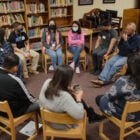Education
New Mexico expands restorative justice pilot project
|
A state pilot program to implement a new discipline approach called restorative justice will expand from 12 to 24 schools in the coming year, according to program coordinator Emma Green.
Green appeared on the local public affairs show New Mexico In Focus last week, explaining restorative justice as a philosophical shift away from zero tolerance, exclusionary, traditional punitive model and a shift when possible toward accountability-based consequences. It brings together the person harmed and the person who did the harm to determine how to make it right, she said.
“I have done over 300 talking circles,” Green said, “And I have never seen more accountability in any human than when somebody understands that they harmed someone else, that maybe they didn’t understand the ripple effect of their action.”
New Mexico In Depth published a story earlier this month about restorative justice to explore new approaches to school discipline after finding that Indigenous students in New Mexico disproportionately experience harsher punitive discipline than other student groups. Executive Director Trip Jennings joined Green and NMiF Executive Producer Jeff Proctor to discuss that work and how restorative justice is gaining a foothold in New Mexico schools:

